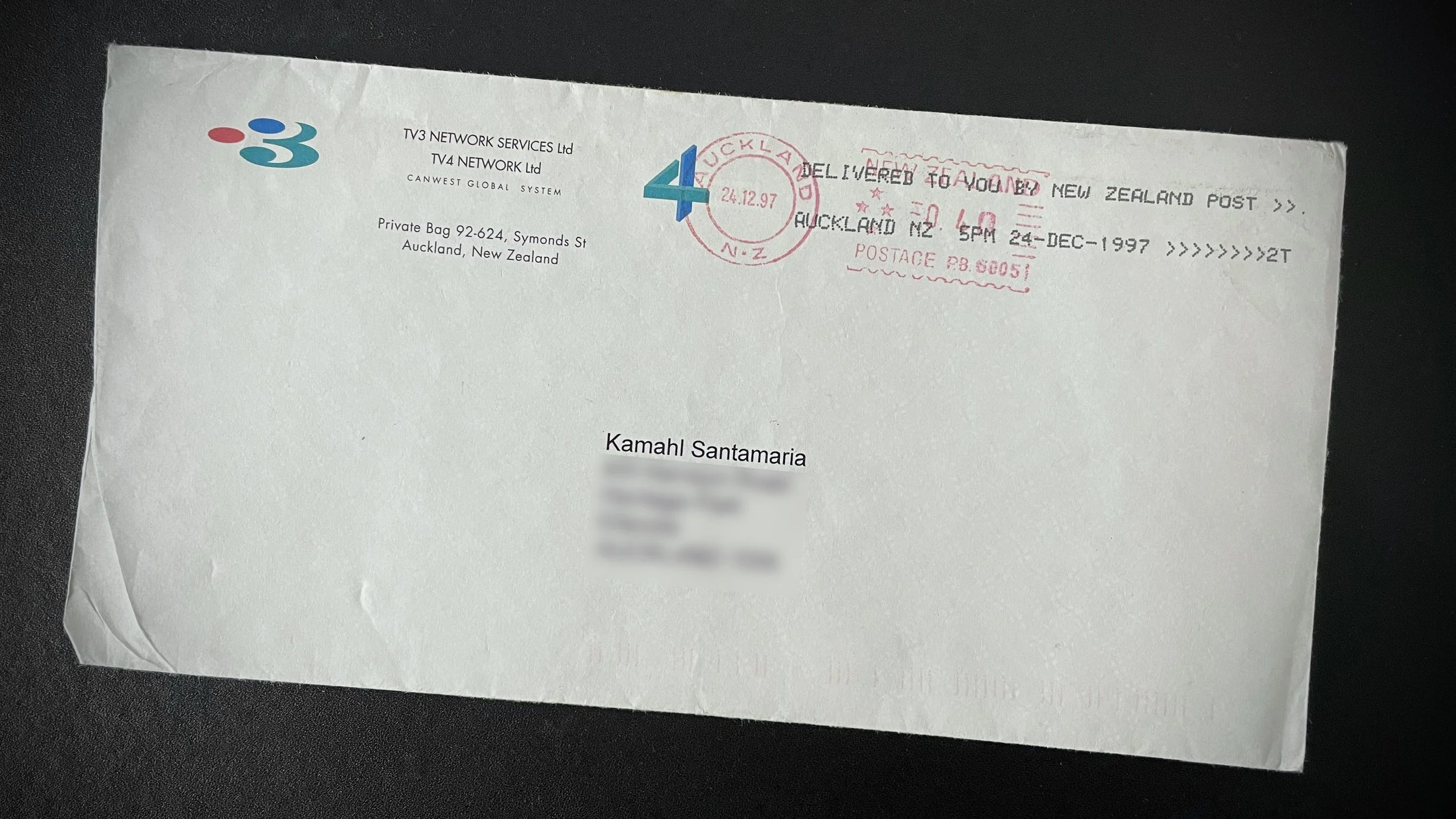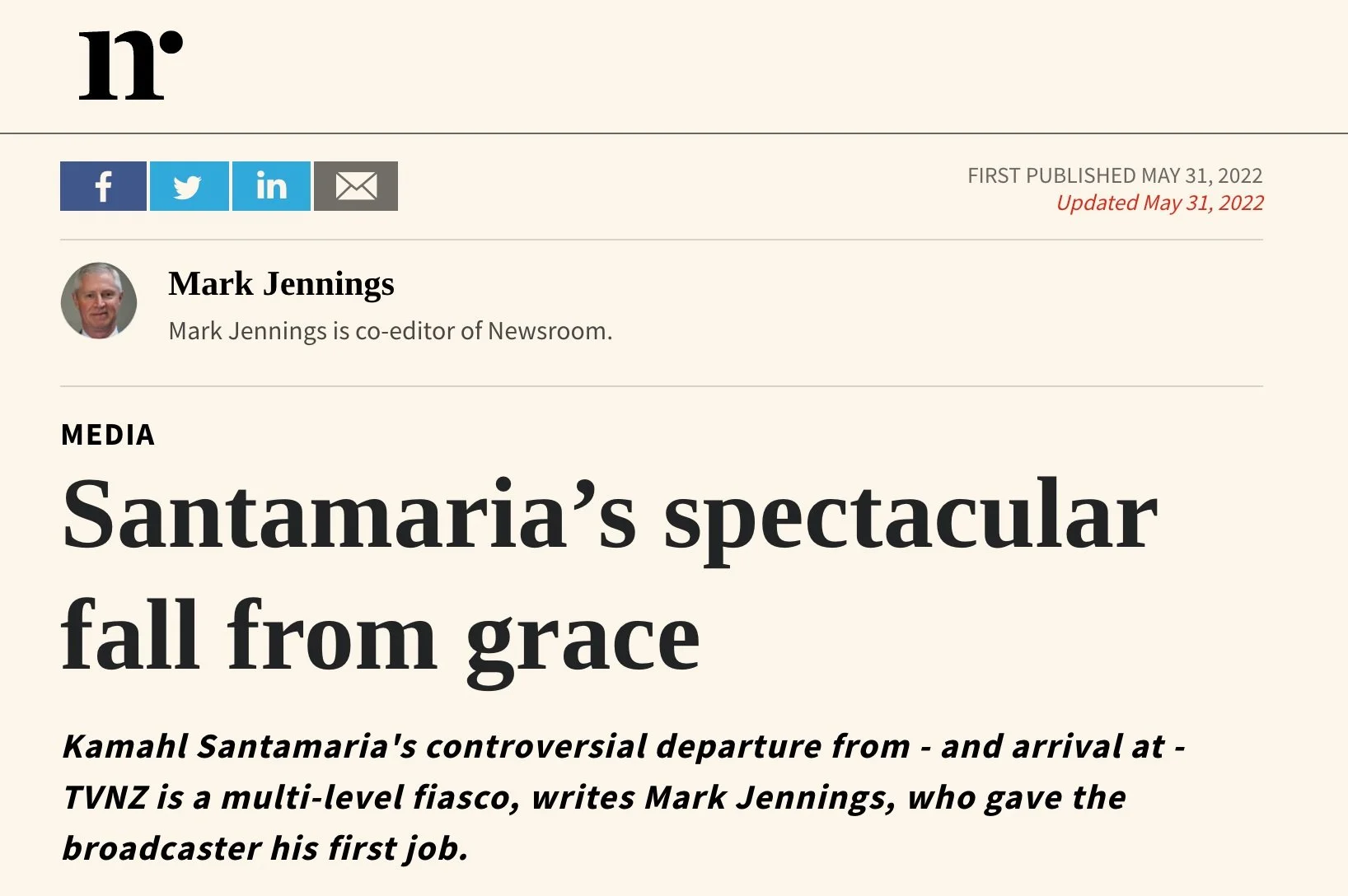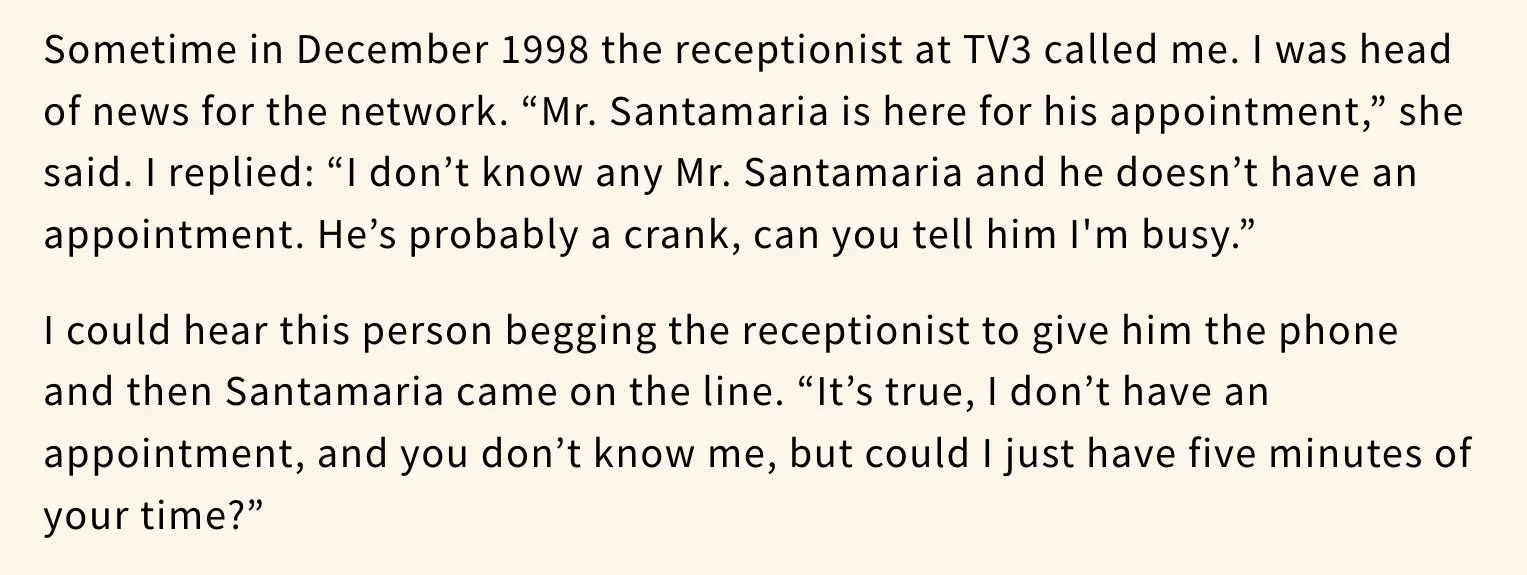The Facts vs The Story
/Clearing out old boxes is always an interesting time. You end up finding things you’d completely forgotten about, things you barely even knew you owned, and things you’d kept because of their sentimental value.
It was the latter which I discovered yesterday. A letter from December 1997 which ended up kick-starting my entire career:
It was from TV3’s then-Head of News and Current Affairs Mark Jennings, now co-editor of newsroom.co.nz. He became my first, and still best news boss.
And it got me thinking about an article he wrote last year for Newsroom, under the headline Santamaria’s spectacular fall from grace. It’s an article I’d only read once until now.
There’s a lot of talk about trust in the media these days, not least of all because of what’s happening at RNZ - which Jennings himself wrote about under the (ironic) headline Media shooting itself in the foot.
Why ironic? Well, I compared the letter and the story…
I’d speculatively sent my CV to TV3 in November 1997, just as I was finishing high school. I was going to university the next year, but was looking to see if there was a chance of some work experience for a keen young student with a burning interest in the news media.
Incredibly, the head of TV3 News wrote back in December, saying he wanted to meet with me in early 1998.
That happened to be a very busy time for him - with the rebrand and relaunch of the 6pm bulletin into a dual-presenter newshour - so the fact that I was getting an invitation from him to meet in person was extraordinary - particularly for someone yet to turn 18.
And here is the article Jennings wrote about me and my departure from TVNZ in May 2022.
Admittedly, there is the better part of 25 years between these two texts. Exact details are going to be a bit fuzzy or - as the late Queen Elizabeth II once so memorably said - “recollections may vary”.
But for me, the phrase which really comes to mind is one which journalists will surely admit to saying at least once, even simply in jest - “don’t let the facts get in the way of a good story”.
This event he’s referring to actually happened in March 1998. He’s conflating different encounters, but fair enough. Like I said, memories can be fuzzy.
Yes I did roll up to TV3 asking to see Mark Jennings, and yes I didn’t have an appointment.
But I didn’t say “you don’t know me” - because he DID know me. I’d met him a month earlier. In his office. For our scheduled meeting. At his request. As per his letter.
A week after that meeting, he’d sent me out for a screen-test with a cantankerous old-school cameraman who scared the crap out of me - probably a wise choice, given the know-it-all teenager he’d been presented with!
But despite repeated attempts to contact him, I hadn’t heard from Jennings again since. So I’d decided to get pro-active, hence the unannounced visit to TV3 HQ.
To be fair, TV3’s newsroom had just gone through all sorts of upheaval after John Hawkesby’s 11th-hour departure the night before the revamped 6pm news went to air - so he’d been pretty busy. (A good reminder that he knows exactly what it’s like when a big-name presenter suddenly leaves, and that the situation is rarely as cut-and-dried as it may seem.)
But for Jennings to quote a recalled conversation saying “I don’t know any Mr. Santamaria, he’s probably a crank”… well, it’s just not true.
It didn’t happen.
What did happen is that his PA came up to reception to meet me, and to organise a time to come back. When I did, he told me that my screen-test was actually very good for someone of my age, but that I just looked too young. Not much I could do about it, so I went back to university for the rest of the year.
What actually happened in December 1998 - 10 months after first meeting him - was that I wrote to Mark Jennings again. Admittedly I didn’t look much older than I had in February, but I still wanted to see what opportunities there might be.
Far from me walking “in off the street looking for a job”, he called me back in for our third meeting, and said I could come in over the post-Christmas/New Year period for two weeks, while he was producing the 6pm news, for some work experience.
And while there’s finally an admission that this isn’t an exact retelling of what happened, it is true - I DID end up “on-air” on my first day.
I’d been sent out to Eden Park with a cameraman to get some pictures of an Auckland v Central Districts cricket match, and when I got back I told Jennings there was a nice angle about an Auckland bowler who took four wickets on debut.
The legendary sports producer Tony Ciprian helped me put a script together (somewhat hesitantly!) and Jennings made the call that I would voice the story for the 6pm news.
On-air, on my first day.
I ended up working and reporting for 21 consecutive days, including an on-the-morning dispatch to Wellington on New Year’s Day where I filed a news and a sports report for the same bulletin, inside six hours.
That was on Day 5 of work experience, and all down to him.
“… somehow wangled a trip to Barbados to cover the finish of the race.”
Wangled, which means ‘managing to obtain something by persuading or cleverly manipulating someone’.
Well as he says, I was assigned to cover the Atlantic Rowing Race for a six-month period. That was HIS choice, and the trip to Barbados at the end was always part of it.
I didn’t wangle anything.
And I’d turned 21 nine months earlier.
She’s not American. And she offered me the phone to use when the landlines weren’t working.
(Okay now I’m just splitting hairs…)
Here’s the rub.
The essence of the story Mark Jennings wrote in May 2022 is sound… that of a pushy teenager, ignoring all normal conventions to try to get a job, who eventually prevails and goes on to have a largely successful career.
But the facts are demonstrably wrong.
And if you’re going to write a story with a headline as bold as “spectacular fall from grace”, then you should have your facts right. That’s to say nothing of the rest of the article, and countless others like it, which drew almost definitive conclusions based on hearsay and allegations.
And - just as has been the case with the RNZ/Russia rewrites - if the telling of those events was wrong, then what else out there is wrong?
I’m not calling Jennings a liar, or suggesting all his work should be audited. As I said, he remains the best news boss I’ve ever had and I owe my entire career to him. But he never contacted me after I left TVNZ or for his story - ironically, given our history, he may have been the one person I would’ve trusted. Someone very close to him though had already reached out, a week into my stint on Breakfast, saying how they thought my broadcasting abilities were better suited to something else - and that he felt the same…
In the end, all of this is a perfect example of a narrative overriding what actually happened.
You may think it’s all pretty minor stuff, given some of the other allegations made against me.
But it’s not minor. It represents everything I’m now trying to counter, in this current media world of suppositions, hearsay, and agendas.
Jennings himself wrote on the RNZ situation:
“When AUT published its 2023 report on trust levels in the media, co-author Dr Greg Treadwell urged newsrooms to “put regaining trust among their audiences at the top of their agenda for the sake of our democracy”.
The road back for the media just hit a major speed bump.”
It’s hard not to agree.








